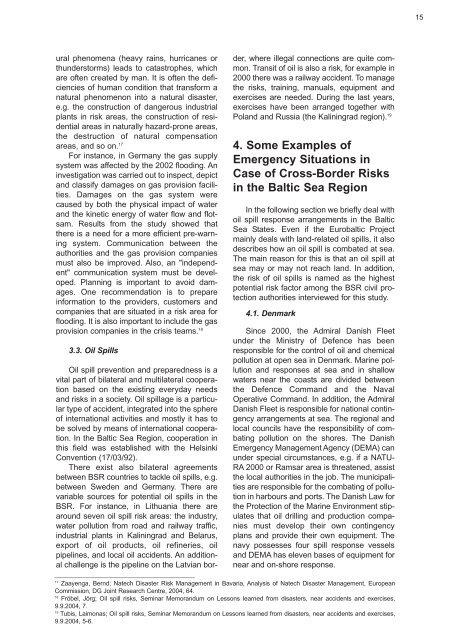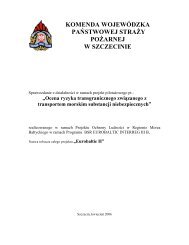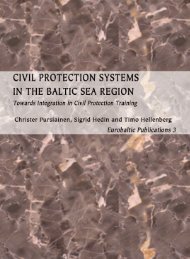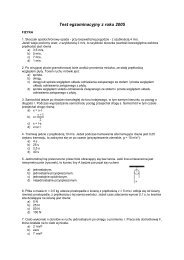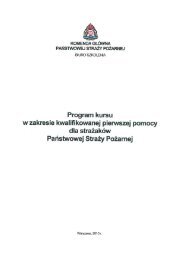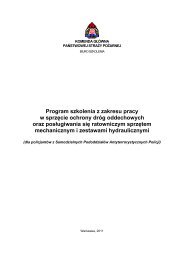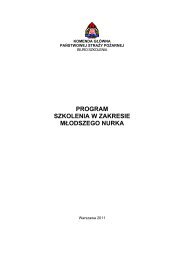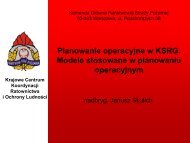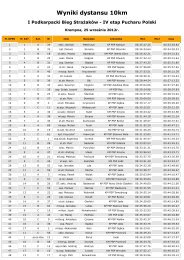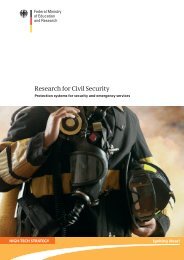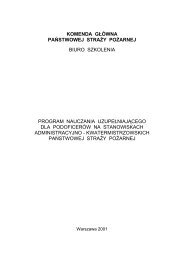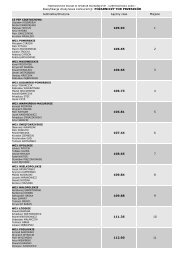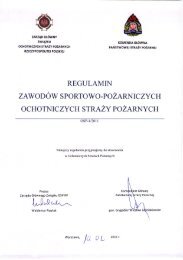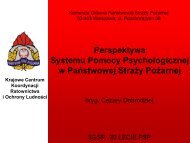Cross-Border Risks in the Baltic Sea Region: Lessons to ... - Helsinki.fi
Cross-Border Risks in the Baltic Sea Region: Lessons to ... - Helsinki.fi
Cross-Border Risks in the Baltic Sea Region: Lessons to ... - Helsinki.fi
Create successful ePaper yourself
Turn your PDF publications into a flip-book with our unique Google optimized e-Paper software.
15<br />
ural phenomena (heavy ra<strong>in</strong>s, hurricanes or<br />
thunders<strong>to</strong>rms) leads <strong>to</strong> catastrophes, which<br />
are often created by man. It is often <strong>the</strong> de<strong>fi</strong>ciencies<br />
of human condition that transform a<br />
natural phenomenon <strong>in</strong><strong>to</strong> a natural disaster,<br />
e.g. <strong>the</strong> construction of dangerous <strong>in</strong>dustrial<br />
plants <strong>in</strong> risk areas, <strong>the</strong> construction of residential<br />
areas <strong>in</strong> naturally hazard-prone areas,<br />
<strong>the</strong> destruction of natural compensation<br />
areas, and so on. 17<br />
For <strong>in</strong>stance, <strong>in</strong> Germany <strong>the</strong> gas supply<br />
system was affected by <strong>the</strong> 2002 flood<strong>in</strong>g. An<br />
<strong>in</strong>vestigation was carried out <strong>to</strong> <strong>in</strong>spect, depict<br />
and classify damages on gas provision facilities.<br />
Damages on <strong>the</strong> gas system were<br />
caused by both <strong>the</strong> physical impact of water<br />
and <strong>the</strong> k<strong>in</strong>etic energy of water flow and flotsam.<br />
Results from <strong>the</strong> study showed that<br />
<strong>the</strong>re is a need for a more ef<strong>fi</strong>cient pre-warn<strong>in</strong>g<br />
system. Communication between <strong>the</strong><br />
authorities and <strong>the</strong> gas provision companies<br />
must also be improved. Also, an "<strong>in</strong>dependent"<br />
communication system must be developed.<br />
Plann<strong>in</strong>g is important <strong>to</strong> avoid damages.<br />
One recommendation is <strong>to</strong> prepare<br />
<strong>in</strong>formation <strong>to</strong> <strong>the</strong> providers, cus<strong>to</strong>mers and<br />
companies that are situated <strong>in</strong> a risk area for<br />
flood<strong>in</strong>g. It is also important <strong>to</strong> <strong>in</strong>clude <strong>the</strong> gas<br />
provision companies <strong>in</strong> <strong>the</strong> crisis teams. 18<br />
3.3. Oil Spills<br />
Oil spill prevention and preparedness is a<br />
vital part of bilateral and multilateral cooperation<br />
based on <strong>the</strong> exist<strong>in</strong>g everyday needs<br />
and risks <strong>in</strong> a society. Oil spillage is a particular<br />
type of accident, <strong>in</strong>tegrated <strong>in</strong><strong>to</strong> <strong>the</strong> sphere<br />
of <strong>in</strong>ternational activities and mostly it has <strong>to</strong><br />
be solved by means of <strong>in</strong>ternational cooperation.<br />
In <strong>the</strong> <strong>Baltic</strong> <strong>Sea</strong> <strong>Region</strong>, cooperation <strong>in</strong><br />
this <strong>fi</strong>eld was established with <strong>the</strong> Hels<strong>in</strong>ki<br />
Convention (17/03/92).<br />
There exist also bilateral agreements<br />
between BSR countries <strong>to</strong> tackle oil spills, e.g.<br />
between Sweden and Germany. There are<br />
variable sources for potential oil spills <strong>in</strong> <strong>the</strong><br />
BSR. For <strong>in</strong>stance, <strong>in</strong> Lithuania <strong>the</strong>re are<br />
around seven oil spill risk areas: <strong>the</strong> <strong>in</strong>dustry,<br />
water pollution from road and railway traf<strong>fi</strong>c,<br />
<strong>in</strong>dustrial plants <strong>in</strong> Kal<strong>in</strong><strong>in</strong>grad and Belarus,<br />
export of oil products, oil ref<strong>in</strong>eries, oil<br />
pipel<strong>in</strong>es, and local oil accidents. An additional<br />
challenge is <strong>the</strong> pipel<strong>in</strong>e on <strong>the</strong> Latvian border,<br />
where illegal connections are quite common.<br />
Transit of oil is also a risk, for example <strong>in</strong><br />
2000 <strong>the</strong>re was a railway accident. To manage<br />
<strong>the</strong> risks, tra<strong>in</strong><strong>in</strong>g, manuals, equipment and<br />
exercises are needed. Dur<strong>in</strong>g <strong>the</strong> last years,<br />
exercises have been arranged <strong>to</strong>ge<strong>the</strong>r with<br />
Poland and Russia (<strong>the</strong> Kal<strong>in</strong><strong>in</strong>grad region). 19<br />
4. Some Examples of<br />
Emergency Situations <strong>in</strong><br />
Case of <strong>Cross</strong>-<strong>Border</strong> <strong>Risks</strong><br />
<strong>in</strong> <strong>the</strong> <strong>Baltic</strong> <strong>Sea</strong> <strong>Region</strong><br />
In <strong>the</strong> follow<strong>in</strong>g section we briefly deal with<br />
oil spill response arrangements <strong>in</strong> <strong>the</strong> <strong>Baltic</strong><br />
<strong>Sea</strong> States. Even if <strong>the</strong> Eurobaltic Project<br />
ma<strong>in</strong>ly deals with land-related oil spills, it also<br />
describes how an oil spill is combated at sea.<br />
The ma<strong>in</strong> reason for this is that an oil spill at<br />
sea may or may not reach land. In addition,<br />
<strong>the</strong> risk of oil spills is named as <strong>the</strong> highest<br />
potential risk fac<strong>to</strong>r among <strong>the</strong> BSR civil protection<br />
authorities <strong>in</strong>terviewed for this study.<br />
4.1. Denmark<br />
S<strong>in</strong>ce 2000, <strong>the</strong> Admiral Danish Fleet<br />
under <strong>the</strong> M<strong>in</strong>istry of Defence has been<br />
responsible for <strong>the</strong> control of oil and chemical<br />
pollution at open sea <strong>in</strong> Denmark. Mar<strong>in</strong>e pollution<br />
and responses at sea and <strong>in</strong> shallow<br />
waters near <strong>the</strong> coasts are divided between<br />
<strong>the</strong> Defence Command and <strong>the</strong> Naval<br />
Operative Command. In addition, <strong>the</strong> Admiral<br />
Danish Fleet is responsible for national cont<strong>in</strong>gency<br />
arrangements at sea. The regional and<br />
local councils have <strong>the</strong> responsibility of combat<strong>in</strong>g<br />
pollution on <strong>the</strong> shores. The Danish<br />
Emergency Management Agency (DEMA) can<br />
under special circumstances, e.g. if a NATU-<br />
RA 2000 or Ramsar area is threatened, assist<br />
<strong>the</strong> local authorities <strong>in</strong> <strong>the</strong> job. The municipalities<br />
are responsible for <strong>the</strong> combat<strong>in</strong>g of pollution<br />
<strong>in</strong> harbours and ports. The Danish Law for<br />
<strong>the</strong> Protection of <strong>the</strong> Mar<strong>in</strong>e Environment stipulates<br />
that oil drill<strong>in</strong>g and production companies<br />
must develop <strong>the</strong>ir own cont<strong>in</strong>gency<br />
plans and provide <strong>the</strong>ir own equipment. The<br />
navy possesses four spill response vessels<br />
and DEMA has eleven bases of equipment for<br />
near and on-shore response.<br />
17<br />
Zaayenga, Bernd; Natech Disaster Risk Management <strong>in</strong> Bavaria, Analysis of Natech Disaster Management, European<br />
Commission, DG Jo<strong>in</strong>t Research Centre, 2004, 64.<br />
18<br />
Fröbel, Jörg; Oil spill risks, Sem<strong>in</strong>ar Memorandum on <strong>Lessons</strong> learned from disasters, near accidents and exercises,<br />
9.9.2004, 7.<br />
19<br />
Tubis, Laimonas; Oil spill risks, Sem<strong>in</strong>ar Memorandum on <strong>Lessons</strong> learned from disasters, near accidents and exercises,<br />
9.9.2004, 5-6.


